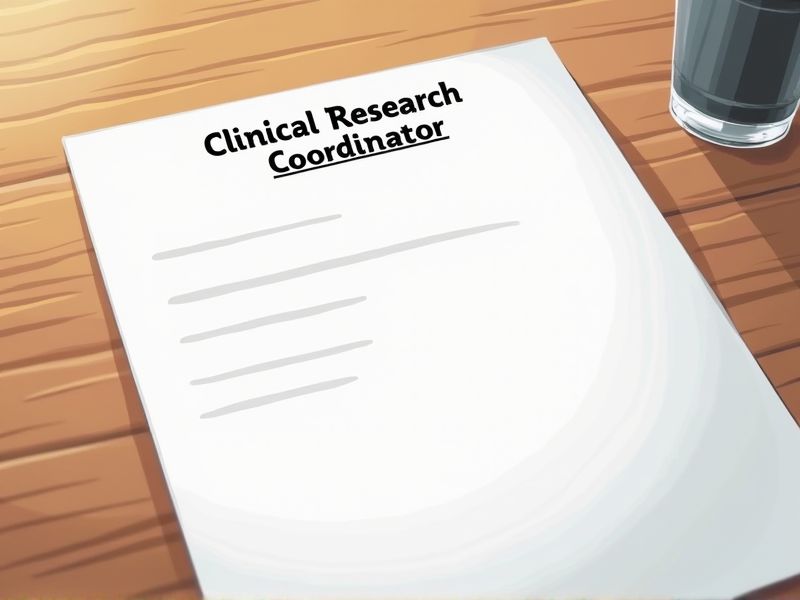
Clinical Research Coordinators play a crucial role in managing clinical trials, ensuring regulatory compliance, and maintaining data integrity. Certifications provide them with essential skills and knowledge to handle complex research protocols and adhere to ethical standards. Qualifications become critical as they often have to interact with multidisciplinary teams, resolve trial-related issues, and ensure participant safety. These important certifications can help equip you for a role as a Clinical Research Coordinator.
Certified Clinical Research Coordinator (CCRC)
A Certified Clinical Research Coordinator (CCRC) ensures adherence to regulatory guidelines, enhancing the credibility and reliability of research data. Having certification demonstrates a professional's advanced knowledge and competence, building trust among stakeholders and participants. This specialized qualification supports effective coordination and management of clinical trials, ultimately improving study outcomes. A CCRC credentials align with industry standards, making individuals more competitive and increasing confidence in operational procedures.
Certified Clinical Research Professional (CCRP)
The Certified Clinical Research Professional (CCRP) credential enhances credibility, signaling that a Clinical Research Coordinator possesses recognized expertise. It ensures adherence to ethical standards in clinical trials, which directly affects participant safety and data integrity. The certification supports career advancement opportunities by distinguishing candidates in a competitive field. Organizations often prefer certified professionals, as it minimizes risks associated with regulatory non-compliance.
Good Clinical Practice (GCP) Certification
Good Clinical Practice (GCP) Certification ensures a Clinical Research Coordinator adheres to ethical and scientific quality standards in conducting clinical trials. This certification provides assurance that the rights, safety, and well-being of trial participants are protected, aligning with established guidelines. GCP Certification contributes to the credibility and reliability of data collected, affecting regulatory compliance and decision-making processes. It equips Clinical Research Coordinators with the necessary knowledge to maintain consistency and integrity across clinical research settings.
Human Subjects Protection (HSP) Certification
HSP Certification ensures Clinical Research Coordinators understand ethical principles, safeguarding human rights and welfare in studies. This certification standardizes the knowledge required to handle sensitive participant data, enhancing trust and compliance with legal regulations. Proper training reduces the likelihood of ethical violations, which can lead to legal repercussions and harm to participants. Certified coordinators help maintain the integrity and credibility of clinical research, promoting public confidence in study results.
International Conference on Harmonisation (ICH) GCP Certification
The ICH GCP Certification ensures that Clinical Research Coordinators (CRCs) adhere to internationally recognized ethical and scientific quality standards, which promotes trust in the research data collected. Regulatory authorities and sponsors often require this certification to ensure compliance with stringent guidelines, reducing the risk of regulatory issues. GCP-certified CRCs demonstrate a commitment to patient safety and rights, which is critical in clinical trials involving human subjects. Certification also enhances the knowledge and skills of CRCs, thus improving the overall quality and efficiency of clinical trials.
Clinical Trials Management Certification
Clinical Trials Management Certification enhances a Clinical Research Coordinator's understanding of regulatory guidelines, ensuring compliance with legal standards. This certification fosters improved project management skills, facilitating efficient trial planning and execution. It enhances credibility and trust with stakeholders, potentially opening up advanced career opportunities. Certification equips coordinators with up-to-date knowledge of best practices, boosting the overall quality of clinical trials.
Clinical Data Management Certification
Clinical Data Management Certification equips a Clinical Research Coordinator with skills necessary to ensure data accuracy and integrity, enhancing the quality of research outcomes. The certification provides knowledge in regulatory compliance, reducing the risk of violations and subsequent penalties. In a competitive landscape, having this certification differentiates professionals, increasing their employability and career advancement opportunities. Acquiring these specialized skills through certification improves the efficiency of data management processes, leading to more reliable study results.
Certified Clinical Research Associate (CCRA)
A Certified Clinical Research Associate (CCRA) is needed to ensure compliance with regulatory requirements in clinical trials, which safeguards participant safety and data integrity. Their expertise helps in effectively monitoring the progress of clinical studies, ensuring adherence to study protocols and guidelines. This certification signifies advanced knowledge and skills, enhancing the credibility and reliability of trial coordination. The presence of a CCRA can also improve the efficiency of operations, leading to timely and accurate trial outcomes.
Biomedical Research Ethics Certification
Biomedical Research Ethics Certification is required for Clinical Research Coordinators to ensure adherence to ethical standards that safeguard participant rights and welfare. Without this certification, coordinators might inadvertently engage in practices that violate ethical norms or legal requirements, potentially jeopardizing research integrity and participant safety. Adoption of these ethical guidelines promotes transparency and trust among stakeholders, including participants, researchers, and regulatory bodies. The certification provides coordinators with a comprehensive understanding of the ethical implications of their work, reducing the risk of legal liabilities and ethical breaches.
Project Management Professional (PMP) Certification
Obtaining a PMP certification equips Clinical Research Coordinators with structured project management skills, enhancing their ability to manage complex clinical trials efficiently. The certification standardizes communication and documentation processes, which improves coordination among multidisciplinary teams. With a PMP certification, coordinators are better prepared to identify risks early, reducing the likelihood of trial delays or compliance issues. PMP-certified coordinators often experience increased trust and credibility from stakeholders, facilitating smoother project execution.
Summary
By obtaining certifications, you enhance your skills and improve your knowledge in clinical research practices. This expertise increases your job marketability, often leading to better job opportunities and career advancement. Employers may recognize your qualifications, resulting in higher trust and responsibility within clinical trials. Consequently, you contribute more effectively to successful research outcomes and compliance with regulatory standards.
